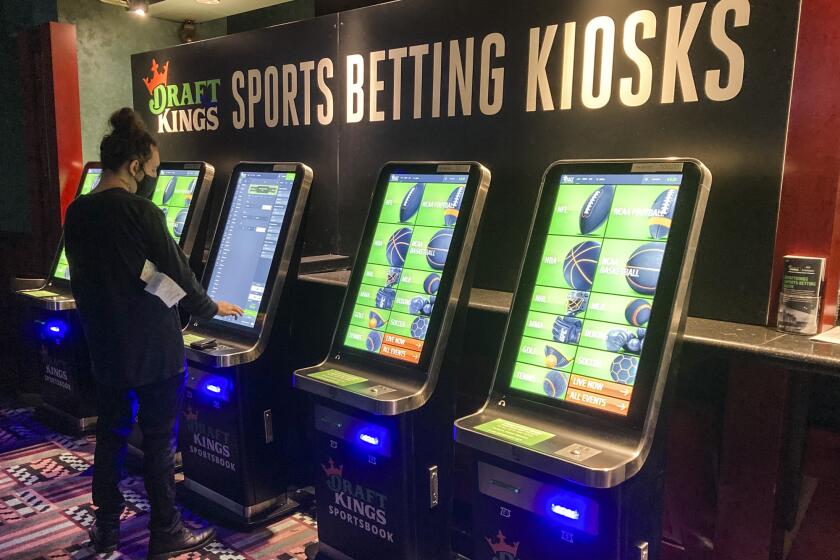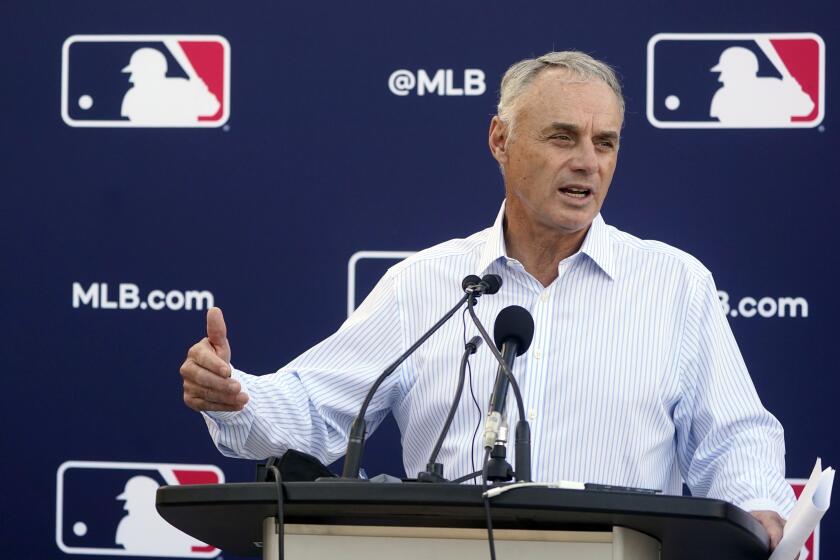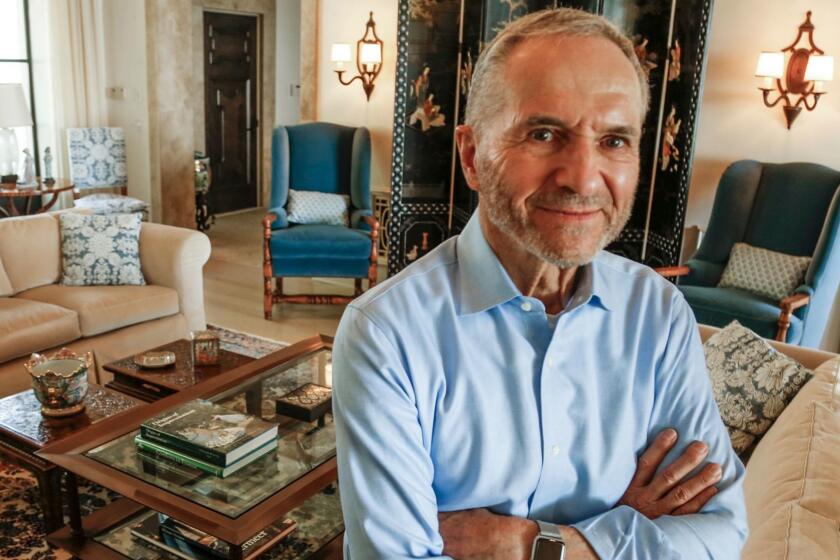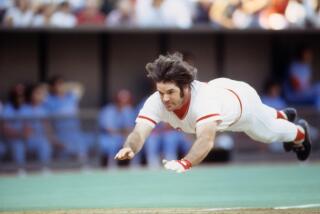Column: It’s not just Shohei — a massive scandal involving sports betting is just around the corner

Question for Major League Baseball: How do you like your sports betting partnerships now?
The question arises at this moment because the league faces what could be a historic scandal involving Shohei Ohtani, its historic superstar.
The Dodgers slugger has maintained that he had nothing to do with the allegedly illegal bets placed by his friend and former interpreter, Ippei Mizuhara, who has been fired by the team.
They got my telephone number and were sending me crazy messages about where I live and my kids and all that stuff ... We may have a 10-point lead and the spread is 11 and people are yelling at me to leave the guys in so that we can cover the spread. ... It is something I believe has gone too far.
— Cleveland Cavaliers Coach J.B. Bickerstaff
Mizuhara originally asserted that Ohtani had covered his gambling losses; Ohtani’s camp has subsequently maintained that Mizuhara covered those losses by stealing from the player. Ohtani says he has never gambled on sports.
At this point, there’s no particular reason to doubt Ohtani’s innocence, but if it turns out that he was involved in betting on baseball, hoo boy, the consequences are dire.
The league penalty for betting on games in which a player was uninvolved — including pro or amateur games going down as far as youth leagues — is a year’s suspension. For betting on games in which the player is involved, the penalty is a permanent ban. For placing bets with an illegal bookmaker, the penalty is up to the league commissioner.
No one has yet been charged with a crime in this case; the alleged bookmaker appears to be the principal target of a federal investigation. Yet, it’s fair to say that this is not what the Dodgers, the league or Ohtani hoped to be dealing with as the 2024 season opened.
The truly toothsome irony in this episode, however, is that it comes as Major League Baseball, like every other major pro sports league in the country, has fully embraced the idea of gambling on its games.
After more than a century spent shunning any connection with gambling, MLB has named the gambling companies FanDuel, DraftKings and MGM Resorts International as its official sports betting partners.
When it signed its deal with FanDuel a year ago, the league praised its new partner as “an industry leader in innovative fan engagement opportunities while also reminding them of the importance of doing it responsibly.”
Proposition 27 is being sold through a spectacularly misleading advertising campaign.
That should give you a taste of the hypocrisy and cynicism with which the pro leagues have justified cozying up to the gambling industry. On the one hand, they say it’s about “fan engagement” — that is, keeping TV viewers in front of their sets even during blowout games involving out-of-market teams. On the other, they’re promoting “responsible gambling.”
Right. We can be sure that such reminders help, just as those exhortations to “drink responsibly” appended to TV ads for beer, whiskey and bourbon have succeeded in eradicating alcoholism in the United States.
The alliances between the sports leagues and the gambling industry have followed the expansion of officially sanctioned gambling nationwide. Only two states ban any form of gambling — Utah and Hawaii. The others sponsor public lotteries, poker clubs, riverboat casinos at which Vegas-like games are on offer, or have made deals with Native American tribes for their own casinos.
All but 12 states allow some form of sports betting — not including California, where ballot measures legalizing sports betting were soundly defeated in 2022. Betting advocates, including the state’s Native American tribes, say the earliest that voters could get another crack at the issue is probably 2028.
The perils of this expansion are manifest. They’ve created a new underclass of gambling addicts while largely failing to fulfill their advocates’ assurances that state-sponsored and regulated gambling would produce a new, risk-free revenue stream for state and local budgets. The outcomes of some games have come under suspicion even where no evidence of fixing has been found.
Can the sports leagues fend off the sort of corruption that resulted in nationwide bans on sports betting in the past? The answer plainly is no. Even assuming that Ohtani is ultimately found to be utterly clean of illicit betting, a new scandal, perhaps even more devastating, almost certainly lurks on the horizon. It might not surface in the next months or even years, but it will happen.
Before examining more deeply the risks that the leagues face from snuggling with the gambling companies, let’s take a quick march through history. The episode that firmly cleaved pro sports from gambling was the 1919 “Black Sox” scandal, when eight members of the Chicago White Sox were accused of throwing the World Series at the behest of a gambling syndicate led by Arnold Rothstein.
Who will stand up for the poor plutocrats who own Major League Baseball?
Although all eight were acquitted at trial, they were all banned permanently by the newly appointed baseball commissioner, former federal judge Kenesaw Mountain Landis, in 1921.
The next landmark in baseball was the 1989 banning of Pete Rose, one of the game’s stars as a player and manager, for allegedly betting not merely on baseball games but on and possibly against his own team, the Cincinnati Reds. Rose also has been permanently excluded from the Hall of Fame.
The National Football League had its own scandals, such as when stars Paul Hornung and Alex Karras were caught betting on football games in 1963 and banned for a year.
Those events occurred when MLB, the NFL and the other major leagues strived to keep gamblers and gaming at arm’s length. Their policies could not have been clearer.
In 1992, when Congress debated outlawing sports betting everywhere but Nevada, where it was grandfathered, then-NFL Commissioner Paul Tagliabue testified that legal sports betting would reduce pro football to a tool for “the fast buck, the quick fix, the desire to get something for nothing.” The bill passed as the Professional and Amateur Sports Protection Act (PASPA) and was signed into law by George H.W. Bush.
In 2003, the NFL rejected a Super Bowl ad from the Las Vegas Convention and Visitors Authority that didn’t overtly mention sports wagering — the city’s image as a gambling mecca was enough.
And in 2013, Tagliabue’s successor, Roger Goodell, issued a statement opposing New Jersey’s effort to overturn PASPA by pointing to “the harm sports gambling poses to the goodwill, character and integrity of NFL football and to the fundamental bonds of loyalty and devotion between fans and team.”
The Supreme Court, however, invalidated PASPA in 2018, allowing the states to make their own decisions about sports betting.
After that, states and the leagues embraced gambling with unseemly haste. At the time of the Supreme Court decision, about $5 billion was wagered on sports in the U.S., all of it in Nevada. Last year, the total was about $120 billion.
Wall Street has just found a way to profit from California’s water scarcity.
The leagues made deals with the gambling firms and allowed discussions of point spreads and other bettable factors onto their broadcasts. Streaming telecasts of ballgames feature up-to-the-moment projections such as the likelihood of a batter striking out on a 3-2 count, or batting in a run, what have you. Who are those for? They’re for viewers making in-game bets on such evanescent propositions.
Does it keep viewers engaged? Apparently. A survey done last year for Variety found that 49% of viewers would keep watching a blowout game if they had a bet down, while only 29% of non-bettors would do so. Advertising dollars depend on eyeballs fixed to the game, so this sort of engagement is a win-win — for the leagues and their advertisers at least, if not always for the saps placing the bets.
In the old days, the leagues had few compunctions about shunning gambling because they saw it as a competing revenue stream. But now they’re in bed with the gamblers, rewarding them with commercial “partnerships” and co-marketing deals.
As a result, there appears to be no limit to how far the leagues will go in encouraging gambling. Rocket Mortgage FieldHouse, where the NBA Cleveland Cavaliers play, has a sports book on the premises so fans can place their bets without leaving the venue. As it happens, Cavs Coach J.B. Bickerstaff has reported receiving threats from gamblers irked at a game’s outcome.
“They got my telephone number and were sending me crazy messages about where I live and my kids and all that stuff,” he said. “We may have a 10-point lead and the spread is 11 and people are yelling at me to leave the guys in so that we can cover the spread. ... It is something I believe has gone too far.”
How do we know that the expansion of gambling will coax some players, coaches and others toward perdition? Because it already is happening. The NFL suspended 10 players for gambling last year. The University of Alabama fired baseball coach Brad Bohannan last year and he was effectively banned by the NCAA on evidence that he had leaked a report of a player’s injury to a gambler. Thirteen current and former athletes at the University of Iowa and Iowa State and two student managers have been charged in an investigation of illegal wagering; 10 have pleaded guilty.
Some games and in-game calls have come under a cloud. A blowout loss last month by the Temple men’s basketball team to the University of Alabama-Birmingham was flagged by a gambling watchdog after the betting line moved suspiciously strongly against Temple the day of the game. Rudy Gobert of the NBA’s Minnesota Timberwolves got benched for a technical foul and a $100,000 fine for making a money-counting gesture at a ref after an adverse call, suggesting that the ref was on the take. (Minnesota won the game anyway.)
Edward O. Thorp doesn’t look like an outlaw.
One need not be a moralist to harbor concerns about the effect of legalized betting on the integrity of college and professional sports. One need only be a realist.
Players are young men and women with more money than they ever dreamed of earning in their lives, and the naivete that comes with youth. It’s not surprising that they might transfer their confidence in their superiority over mere mortals from the playing field to the gambling table or sports book. If they get into financial trouble, a promise from a gambler in return for a shaved point might not be far behind.
As for the gamblers, if there’s anything I learned from hanging around with Las Vegas card counters some years ago — for a magazine article, not to play — it’s that every professional gambler is perpetually searching for “a beatable game,” that is, for even the tiniest edge. What’s a better edge than having a player or coach on the inside?
It’s probably too late to turn back the tide. There’s too much money in sports betting, which will make it almost difficult to put a leash on its continued growth. When the inevitable scandal erupts to bite the leagues and their political enablers, they will be stuck. Their games’ integrity will come under a permanent cloud. Sports won’t be anywhere nearly as fun as it used to be. And they’ll have only themselves to blame.














